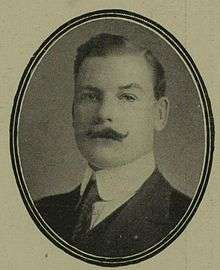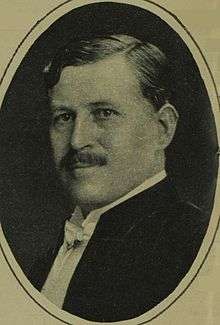Banffshire (UK Parliament constituency)
Banffshire was a constituency of the House of Commons of Great Britain from 1708 to 1800, and of the House of Commons of the Parliament of the United Kingdom from 1801 to 1983. It elected one Member of Parliament (MP), using the first-past-the-post voting system.
The constituency covered the county of Banffshire, Scotland, but until 1918 the county town of Banff and the burgh of Cullen were represented as part of Elgin Burghs.
In 1983 it was split and merged into Moray and Banff and Buchan.
Members of Parliament
Election results
Elections in the 1850s
Elections in the 1860s
Elections in the 1880s
Having accepted office as Civil Lord of the Admiralty, Robert Duff was returned unopposed at a by-election on 13 February 1886.
Elections in the 1890s

Robert Duff

W. Wedderburn
Elections in the 1900s

Alexander Black

Walter Waring
Elections in the 1910s
General Election 1914/15:
Another General Election was required to take place before the end of 1915. The political parties had been making preparations for an election to take place and by the July 1914, the following candidates had been selected;

Charles Barrie
- endorsed by Coalition Government
Elections in the 1920s
Elections in the 1930s
General Election 1939/40
Another General Election was required to take place before the end of 1940. The political parties had been making preparations for an election to take place and by the Autumn of 1939, the following candidates had been selected;
Elections in the 1940s
Elections in the 1950s
Elections in the 1960s
Elections in the 1970s
References
- ↑ Stooks Smith, Henry. (1973) [1844–1850]. Craig, F. W. S., ed. The Parliaments of England (2nd ed.). Chichester: Parliamentary Research Services. pp. 622–623. ISBN 0-900178-13-2.
- ↑ Leigh Rayment's Historical List of MPs – Constituencies beginning with "B" (part 1)
- ↑ The Times, 1 July 1857
- ↑ Debrett's House of Commons, 1870
- 1 2 Debrett's House of Commons and the Judicial Bench, 1889
- ↑ Whitaker's Almanack, 1893
- ↑ The Times, 17 March 1893
- 1 2 Debrett's House of Commons and the Judicial Bench, 1901
- ↑ Whitaker's Almanack, 1907
- ↑ The Times, 19 Feb 1907
- 1 2 Debrett's House of Commons and the Judicial Bench, 1916
- ↑ Whitaker's Almanack, 1920
- ↑ The Times, 17 November 1922
- ↑ The Times, 8 December 1923
- ↑ Oliver & Boyd's Edinburgh Almanack, 1927
- ↑ The Times, 1 June 1929
- ↑ Whitaker's Almanack, 1934
- ↑ Whitaker's Almanack, 1939
- ↑ The Liberal Magazine, 1939
- ↑ Report of the Annual Conference of the Labour Party, 1939
- ↑
- ↑
- ↑
- ↑
- ↑ Whitaker's Almanack, 1963
- ↑
- 1 2
|
|---|
|
|
- Aberdeen North
- Aberdeen South
- Airdrie & Shotts
- Angus
- Argyll & Bute
- Ayr, Carrick & Cumnock
- Banff & Buchan
- Berwickshire, Roxburgh & Selkirk
- Caithness, Sutherland & Easter Ross
- Central Ayrshire
- Coatbridge, Chryston & Bellshill
- Cumbernauld, Kilsyth & Kirkintilloch East
- Dumfries & Galloway
- Dumfriesshire, Clydesdale & Tweeddale
- Dundee East
- Dundee West
- Dunfermline & West Fife
- East Dunbartonshire
- East Kilbride, Strathaven & Lesmahagow
- East Lothian
- East Renfrewshire
- Edinburgh East
- Edinburgh North & Leith
- Edinburgh South
- Edinburgh South West
- Edinburgh West
- Falkirk
- Glasgow Central
- Glasgow East
- Glasgow North
- Glasgow North East
- Glasgow North West
- Glasgow South
- Glasgow South West
- Glenrothes
- Gordon
- Inverclyde
- Inverness, Nairn, Badenoch & Strathspey
- Kilmarnock & Loudoun
- Kirkcaldy & Cowdenbeath
- Lanark & Hamilton East
- Linlithgow & East Falkirk
- Livingston
- Midlothian
- Moray
- Motherwell & Wishaw
- Na h-Eileanan an Iar
- North Ayrshire & Arran
- North East Fife
- Ochil & South Perthshire
- Orkney & Shetland
- Paisley & Renfrewshire North
- Paisley & Renfrewshire South
- Perth & North Perthshire
- Ross, Skye & Lochaber
- Rutherglen & Hamilton West
- Stirling
- West Aberdeenshire & Kincardine
- West Dunbartonshire
|




